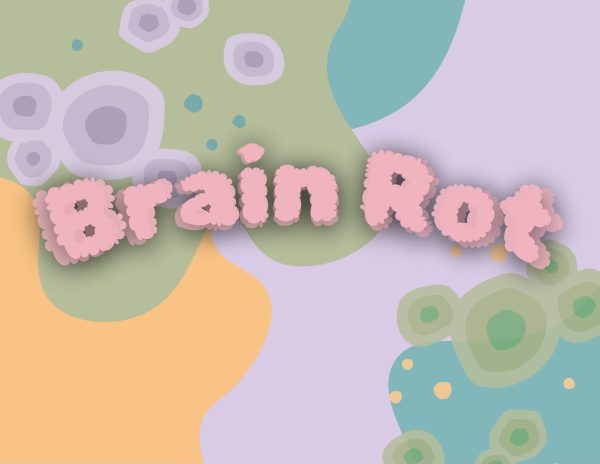On Monday, Oxford University Press released their 2024 Word of the Year: “brain rot.” The announcement cements a piece of today’s culture in a theme prevalent among previous Words of the Year, including “rizz” (2023), “goblin mode” (2022), and “vax” (2021), and drew mixed emotions from community members.

Within their article announcing and explaining this decision, Oxford said, “Our language experts created a shortlist of six words [brain rot, demure, dynamic pricing, lore, romantasy, slop] to reflect the moods and conversations that have helped shape the past year. After two weeks of public voting and widespread conversation, our experts came together to consider the public’s input, voting results, and our language data, before declaring ‘brain rot’ as the definitive Word of the Year for 2024.”
As for the word itself, brain rot is a noun, defined as “an inability to think clearly, caused by excessive consumption of low-quality online content” or “material, especially on the internet, that is not intellectually stimulating” by Collins Dictionary.
According to Andrew Zhou ’25, “Brain Rot is absurdist Gen-Z, Gen-Alpha humor.” Zhou affirmed his qualifications in making his statement, saying, “I think I’m fairly in touch with a lot of online culture, in terms of references and humor. At the same time, I’m also old enough and mature enough to analyze where these things are coming from.”
“I think brain rot being the word of the year is a sign of the times,” Zhou said. “A lot of our culture – not just young people, but all age groups – is moving towards being online-based. Because it’s online, people are more connected … It’s younger people’s humor. It’s a cultural phenomenon,” said Zhou.

Jared Kolaris ’25 agreed that brain rot was worthy of the title.
“Especially since the beginning of the school year, brain rot, as a concept, has just taken off like a rocket ship. It’s everywhere. It’s massive,” Kolaris said.
English Department Chair Dan Sussman connected the dots between culture and language.
While Sussman declined to comment on the choice of brain rot due to his self-proclaimed lack of qualifications, he emphasized that words allow people to communicate and bridge gaps that would otherwise remain blocked.
“I think culture is built out of language. I think that, as people, we only think and feel the things we have words for,” Sussman said.
In the same vein, Oxford’s Word of the Year has always been a means of paying homage to the way that language has influenced and continues to represent the culture of the previous year. For instance, in 2019, the Word of the Year was “climate emergency.” In 2020, Oxford chose not to select a singular word, acknowledging the unprecedented impacts of the COVID-19 pandemic.
Interestingly, brain rot hasn’t always been a word with positive connotations; in fact, it was particularly infamous in the 19th century, when it was first used. In 1854, English scholar Henry David Thoreau criticized mainstream oversimplification in his novel Walden / Life in The Woods, writing, “Why level downward to our dullest perception always, and praise that as common sense? … [England] will not any endeavor to cure the brain-rot, which prevails … widely and fatally.”
Drew Matta ’26 expressed disappointment in the Word of the Year.
“I think it’s ridiculous … The point of the Oxford dictionary is to be legit,” said Matta.
Health and Physical Education teacher Erick Cotter echoed those sentiments, saying, “I haven’t read many scholarly articles that deal with brain rot. It seems obscure, like it came out of left field.”
Karington Colon ’27 stated simply, “I think it’s actually insane.”
Sources Referenced
Chappell, Bill. “Writer Thoreau Warned of Brain Tot in 1854. Now It’s the Oxford Word of 2024.” NPR, 2 Dec. 2024, www.npr.org/2024/12/02/nx-s1-5213682/writer-thoreau-warned-of-brain-rot-in-1854-now-its-the-oxford-word-of-2024. Accessed 6 Dec. 2024.
“Definition of ’Brainrot.'” Collins English Dictionary, HarperCollins Publishers, www.collinsdictionary.com/us/dictionary/english/brainrot. Accessed 6 Dec. 2024.
OxfordLanguages. “Oxford Word of the Year 2022.” OxfordLanguages, languages.oup.com/word-of-the-year/2022/. Accessed 6 Dec. 2024.
OxfordLanguages. “Word of the Year 2021: Vax.” OxfordLanguages, languages.oup.com/word-of-the-year/2021/. Accessed 6 Dec. 2024.
OxfordLanguages. “Oxford Word of the Year 2019.” OxfordLanguages, https://languages.oup.com/word-of-the-year/2019/#:~:text=The%20Oxford%20Word%20of%20the%20Year%202019%20is%20climate%20emergency,environmental%20damage%20resulting%20from%20it. Accessed 6 Dec. 2024.
OxfordLanguages. “2020: Words of an Unprecedented Year.” https://languages.oup.com/wp-content/uploads/oxford-languages-words-of-an-unprecedented-year-2020.pdf.
OxfordLanguages. “Oxford Word of the Year 2023.” OxfordLanguages, languages.oup.com/word-of-the-year/2023/. Accessed 6 Dec. 2024.
Oxford University Press. “‘Brain rot’ Named Oxford Word of the Year 2024.” Oxford University Press, 2 Dec. 2024, corp.oup.com/news/brain-rot-named-oxford-word-of-the-year-2024/. Accessed 6 Dec. 2024.
Thoreau, Henry David. WALDEN; or, Life in the Woods. E-book ed., Project Gutenberg. https://www.gutenberg.org/files/205/205-h/205-h.htm.











